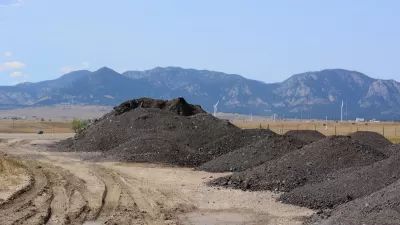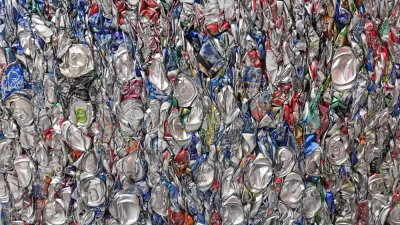A global shift in the market has upended the recycling industry. The story of recycling's past provides direction for the future.

A series of illustrations by Katie Wheeler explains the current crisis in recycling and puts out a call to action to rethink the whole waste management process.
The illustrations reveal a history that might be unknown to many American consumers, about a ship named the Mobro in 1987 that created the controversy that birthed the environmental regulations and recycling programs ubiquitous in U.S. cities today.
Along the way, the illustrations explain multi-stream recycling vs. single-stream recycling, materials recovery facilities, contamination, mixed plastic, mixed paper, and the Chinese National Sword policy.
The Chinese National Sword policy happens to be the reason the U.S. recycling industry is in crisis in 2019. Designed to improve environmental conditions in China, the National Sword Policy banned several types of materials from entering China and set very high contamination rates on other kinds of material. "U.S. scrap plastic exports to China have fallen 90% since before the ban, and mixed paper exports have completely halted," explains Wheeler.
The illustrations continue from that point, describing the market evolution and facility upgrades that are already underway to respond to the global shift in the waste market. Still, there's a long way to go in the U.S. and in other countries around the world to overcome the critical challenges of waste management. The illustrations include a detailed explanation of the required course of action—one which will take all U.S. consumers to participate in recycling programs at a much higher level of education and require improved practices regarding single use containers and other waste generators.
FULL STORY: It’s Time to Rethink How Recycling is Done

Planetizen Federal Action Tracker
A weekly monitor of how Trump’s orders and actions are impacting planners and planning in America.

Map: Where Senate Republicans Want to Sell Your Public Lands
For public land advocates, the Senate Republicans’ proposal to sell millions of acres of public land in the West is “the biggest fight of their careers.”

Restaurant Patios Were a Pandemic Win — Why Were They so Hard to Keep?
Social distancing requirements and changes in travel patterns prompted cities to pilot new uses for street and sidewalk space. Then it got complicated.

Platform Pilsner: Vancouver Transit Agency Releases... a Beer?
TransLink will receive a portion of every sale of the four-pack.

Toronto Weighs Cheaper Transit, Parking Hikes for Major Events
Special event rates would take effect during large festivals, sports games and concerts to ‘discourage driving, manage congestion and free up space for transit.”

Berlin to Consider Car-Free Zone Larger Than Manhattan
The area bound by the 22-mile Ringbahn would still allow 12 uses of a private automobile per year per person, and several other exemptions.
Urban Design for Planners 1: Software Tools
This six-course series explores essential urban design concepts using open source software and equips planners with the tools they need to participate fully in the urban design process.
Planning for Universal Design
Learn the tools for implementing Universal Design in planning regulations.
Heyer Gruel & Associates PA
JM Goldson LLC
Custer County Colorado
City of Camden Redevelopment Agency
City of Astoria
Transportation Research & Education Center (TREC) at Portland State University
Camden Redevelopment Agency
City of Claremont
Municipality of Princeton (NJ)





























